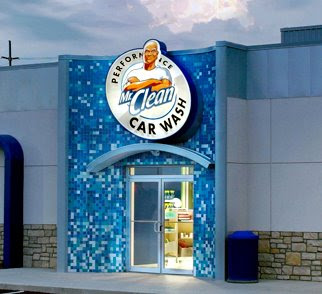
Mr. Clean Takes Car Wash Gig
As Originally Posted in The Wall Street Journal
Now Procter & Gamble Co. wants to wash your car.
The giant manufacturer of household staples including Pampers diapers, Crest toothpaste and Gillette razors is forging a new business model: franchising car washes.
To jump-start plans for a nationwide chain of Mr. Clean Car Wash franchises, P&G in December acquired the franchise assets of Atlanta-based Carnett's Car Wash, which has 14 locations.
"We need to look for new opportunities to allow us to grow," says Bruce Brown, P&G's chief technology officer. "That isn't limited to things within our current business model."
P&G is under mounting pressure to find new sources of revenue growth, particularly as more cash-strapped shoppers think twice about buying its premium-priced products. Wall Street is increasingly skeptical that the mammoth company can garner meaningful gains in its slow-growing product categories and a tough economy.
Known for exhaustively testing new ideas, Procter & Gamble has been quietly experimenting with service businesses in recent years. Since 2007, it has operated two Mr. Clean Car Washes near its Cincinnati headquarters. Last year, it unveiled three Tide dry-cleaning shops in Kansas City, Kan., area. Also in 2007, P&G said it bought a minority stake in membership-based medical services firm MDVIP, based in Boca Raton, Fla.
Professional car washing, which rings up about $35 billion in sales a year in the U.S., according to P&G estimates, won out as the company's first major franchise push. "We want to blow this out to a national network of car washes," Mr. Brown says.
The car-washing business has a handful of competitive advantages, says Nathan Estruth, vice president of P&G's FutureWorks, which develops new business ventures. It lacks a dominant national chain, aging baby boomers are reluctant to wash cars themselves and more water-strapped communities are pushing professional car cleaning as a conservation measure.
Forming a franchise system, rather than owning locations, means "we don't have to enter a capital-intensive business," he says.
Procter's previous attempts at entering the service industry have failed. In 2000, P&G operated a laundry service called Juvian Fabric Care, which it sold in 2003. Other efforts at company-owned stores, including one called Culinary Sol, also fell short.
"We need to focus on the things we're really good at and find partners for the things we're not good at," Mr. Brown says.
P&G marketers are also eager to see if Mr. Clean Car Washes dotting roadways will help boost the image and exposure of the overall brand. Mr. Estruth puts it whimsically. Expanding into franchises, he says, is "broadening Mr. Clean's shoulders as a magical helper."
The company struck the Carnett's deal mostly for the expertise of its owners, Bruce Arnett Sr. and Bruce Arnett Jr., who have more than 50 years of car-wash industry experience between them. Mr. Arnett Sr. is CEO of the Mr. Clean Car Wash franchises, and his son is chief operating officer. Franchise operators are currently being recruited, with an initial investment of about $500,000, Mr. Arnett Sr. says.
Unlike most franchise start-ups, which require enormous marketing investment, Mr. Clean Car Washes come with a 51-year-old brand name, which P&G hopes will lure potential franchisees.
P&G knows people may cut down on car washing in the recession. But franchise guru James Amos notes that the lawn franchise industry typically grows during economic slowdowns. With more people out of work, "there's a larger pool of franchise candidates," says Mr. Amos, chairman of P&G's franchising-subsidiary board.
P&G, which scrutinizes shoppers down to the seconds it takes to notice a bottle on a store shelf, says it will offer franchisees detailed information about car-wash locations, consumer targeting and advertising response rates -- techniques developed during the Cincinnati-area tests that P&G will combine with the Arnetts' experience.
The Arnetts have deconstructed each step of a car wash in their franchisee-training process, including the precise location of where to start wiping a window and the direction in which the first stroke needs to go. Towel care also counts. "It matters what temperature you use to wash them," says Mr. Estruth of the lessons learned from the Arnetts.
Finally, the Arnetts say, it's important to add a little "Hollywood" to the process, which includes a theatrical snap of a towel before it is laid down in front of the car door so the customer can wipe his or her feet before getting into their car, Mr. Arnett Jr. says.
